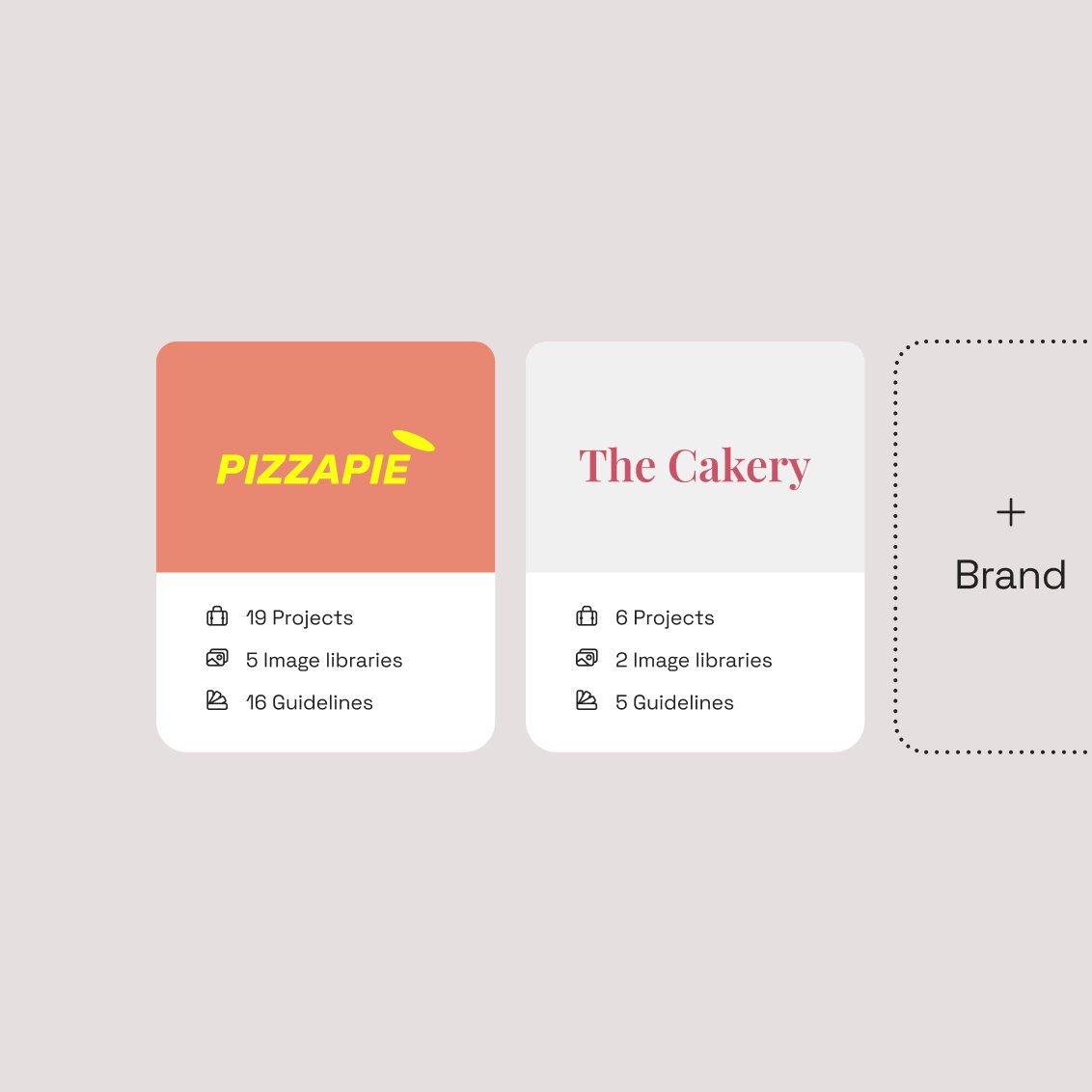Customers today face more options than ever. A simple search on Amazon will bring up dozens of lookalike products, with little to differentiate one from the next. That’s where brand comes in. You’re much more likely to buy from a company you recognize rather than a name you’ve never heard of.
Brand building is the key to increasing trust, awareness, and recognition for your company. Long term, it also helps build customer loyalty. Invest in brand building as early as possible to improve your brand perception in its market.
What is brand building?
Brand building is the process of investing in, developing, and maintaining your company’s brand long term.
Often companies think of brand building as the work involved in setting out their visual identity, like its logo and color palette. But design work is just one part of building a successful, recognizable brand.
The brand-building process involves:
- Setting a clear brand identity. This identity includes your brand’s values and brand principles, visual elements – like your logo design, color palette, fonts, and icons – as well as your messaging and brand voice.
- Aligning on values internally. Shared values and culture are the foundation of your brand, and internal values alignment helps to build a brand that feels authentic to your employees and customers. Shared values are increasingly important to your customers: 5W’s consumer culture report found that 72% of consumers prefer buying from companies aligned with their values.
- Creating and sharing clear guidelines to demonstrate and document what is and isn’t on-brand. These guidelines help your employees know what your brand should look like to improve consistency. Our State of Brand Ownership report found that too much deviation from the core brand visual style means “the brand identity can quickly begin to diverge across channels and look unprofessional.”
- Engaging your whole team. If you can engage your employees with brand building, you’ll have a stronger internal brand. This will make it easier to present a consistent, aligned, customer-facing brand.
Building a strong brand is a long-term project that can’t be achieved overnight, or on your own. The sooner you start developing and defining your brand, the sooner you’ll start to experience the benefits that a consistent, recognizable brand can bring to your company.
Benefits of brand building and why it's important
In the long run, a strong brand will massively increase the value of a company – just think of Apple, Coca-Cola, or Uber. Define your brand, and you’ll be set to build brand awareness and connect more closely with your existing customers.
Improved brand recognition
Brand recognition is how well your customers and target audience can identify your business and products in the wild against your competitors.
A big part of this recognition? Brand consistency. When you set clear guidelines around your brand visuals and messaging, team members can reliably present your company in the same way across your product, marketing campaigns, sales materials, and company messaging. Consistent representation of your product and messaging help your audience know when they’re interacting with your company.
Easier customer acquisition
A strong brand can make it easier to acquire new customers. It can drive trust in your products and help you stand out in a crowded market until you become the biggest name in your category.
As well as seeing your customer numbers increase, you’ll see the impact of brand building reflected in other ways:
- Higher advertising effectiveness – whether it’s an advert in a subway station or before a YouTube video, a strong brand means people are more likely to recognize your adverts and take action. The more effective your advertising, the more likely people are to purchase the products on display (or at least click through to learn more about them).
- Lower price sensitivity – if customers love your brand and your products, the price becomes less of a factor when they’re deciding whether or not to buy from you. Long term, you can charge more for your products – like how Apple’s 2008 iPhone 3G started at $199, while the 2021 iPhone 13 starts at $799.
Stronger customer loyalty
Increased brand loyalty is good for your company’s bottom line. Accenture found that 57% of customers spend more money with companies and brands to which they feel loyalty.
Many things can help build customer loyalty for your brand, including quality products and your support experience. But shared values are an often-overlooked element that builds connections between customers and brands. According to Sprout Social, 64% of consumers "want brands to connect with them," and "connection breeds loyalty."
The brand-building process involves defining your company’s values. Work with your fellow team members to define the principles that drive your business and motivate your customers.
How to build a strong, authentic brand
Brand building takes time and consistent effort, so it’s not something you can achieve in a single sprint. Follow the steps below to develop and maintain an authentic brand over time.
1. Discover your brand identity
It’s likely you already have an informal brand identity but have never spent the time defining it properly. To develop your brand identity:
- Assess your market position to identify your competitors, your target audience, and how they perceive you.
- Uncover your brand values by working with internal stakeholders and team members to understand the principles that are most important to your business.
- Develop your visual brand identity based on input from other team members to ensure it is an authentic representation of your brand’s values and personality.
2. Assess your brand maturity stage
Companies go through different stages of brand maturity as they grow:
- Discovery – Your brand is implicit rather than something that’s defined and documented.
- Enabler – You’ve started building a brand and understand the importance of brand management.
- Co-Creation – You’ve got a formalized brand strategy, and the whole company is invested in your brand vision.
- Brand-Driven – Your brand strategy is broken down by department, and you have a centralized brand management system in place.
- Brand-Excellence – Your brand is well known and recognized, and customers perceive it as valuable and desirable.
-

You start at the Discovery phase, where you have an implicit, informal brand with no real strategy behind it. But by the time you reach the Brand-Excellence phase, you have an established brand with significant business equity, loyalty, and recognition.
Understanding your brand’s current maturity level will help you identify suitable next steps and priorities to help grow your brand. It’s easier to improve and develop your brand if you have a clear understanding of where you are now and where you want to go.
3. Develop your brand’s look, feel, & sound
At this stage, it’s time to set your brand’s visual identity (your logo, colors, fonts, icons, and image style) and the way it sounds (its messaging, voice, and tone).
Companies often choose to work with creative agencies to develop their brand’s tone and visual style. But if you want to develop your brand style in-house, there are lots of brand exercises you can follow to define your brand, such as:
- Describing the opposite of your brand. Companies may find it hard to define their brand values or style but will find it easier to list out things that don’t fit with their brand identity.
- Describing your brand as a person. It can feel difficult to describe your brand in abstract terms, so this can help it feel more tangible.
- Using This or That. Use the brand personality spectrum to help you understand the main attributes of your brand personality.
Understanding your brand personality will help you choose brand colors that best fit and find a visual style that reflects your brand identity.
4. Formalize your brand guidelines
Consistency is crucial for building a recognizable brand. Brand guidelines help you achieve consistency by documenting your style, tone, and values for everyone at your company.
Your brand guidelines should include:
- Brand values
- Design elements including logos, fonts, color palettes, icons, imagery
- Voice and tone
- Practical guidance on how and when to use your brand elements
- Guidance for adapting your brand to different channels

5. Encourage brand engagement
Your employees can be the biggest advocates for your business if you bring them into the brand-building process. Our State of Brand Ownership report found that 69% of respondents want “more ownership in the development and management of their brand,” but employees often feel that brand activities fall outside of their role and are reluctant to engage with the brand.
Help employees become active brand builders and advocates by making it easy to engage with the brand. Invite employees from all teams to offer feedback on the brand and give everyone the tools to create, access, and use branded materials without needing to go through your marketing team (more on those tools in the next section).
Your employees are your secret weapon when it comes to brand building. Once your team is on board, it’s easier to present a consistent, authentic brand to the outside world.
6. Build brand equity
Brand equity is “the value that customers assign to a business based on their perceptions of its quality.” Your number of branded searches over time and the number of word-of-mouth referrals you get are both brand equity indicators.
There are many ways to increase the value of your brand in the eyes of your customers:
- Tap into the power of aspirational marketing. Buyers will form a positive association with your brand if they believe your products will help them to become the person they want to be.
- Harness social proof to show how much customers love your brand.
- Focus on delivering consistently high-quality service at every customer interaction.
Building brand equity is the final step in your brand-building process. It’s where you see the returns from investing in your brand, with increased brand presence and customer recognition turning into real revenue growth for your company.
Frontify is your complete brand-building toolkit
Brand building requires engagement from your whole team, but it can be difficult to collaborate consistently and efficiently without the right tools in place. Improve collaboration across teams with a centralized brand management platform like Frontify.
A centralized platform becomes your company’s single source of truth for everything brand related. It’s where your brand guidelines live and where you upload all the different creative assets – from individual icons to completed visuals for your next social media advertising campaign.
Everything’s in one place, so there’s no risk of using out-of-date brand assets or messaging. Companies can keep their guidelines and assets up to date, streamline the distribution of campaign materials to key stakeholders, collaborate and share feedback and approvals, and easily use creative templates across the company.
Our platform brings together everything you need to develop, evolve, and use your brand:
- Brand Guidelines – Many companies document their brand guidelines in PDF documents, which can be a big headache for marketing and branding teams. These static documents soon become outdated and can be expensive and time consuming to maintain. Frontify brings your brand guidelines into a centralized, online platform that is easy to update and your whole team can access.
- Digital Asset Management (DAM) – A digital asset management system is where you store, organize, find, and access any digital assets your company uses, making it a centralized home for all your brand assets. With our DAM, you won’t need to hunt through disorganized shared drives looking for a particular brand asset anymore.
- Creative Collaboration – This part of the Frontify platform is a space for employees to work together on brand projects. They can share work-in-progress from their preferred design tools like Figma or Sketch and get feedback and sign-off from key stakeholders.
- Digital & Print Templates – Our Digital & Print Templates help employees from different teams create their own brand assets without compromising the quality or consistency of your brand. They help everyone work on your brand rather than relying on your designers all the time.
Our State of Brand Ownership report found that 70% of respondents “need access to brand material weekly to complete their marketing, design, and development projects.” Without a centralized platform in place, employees face huge amounts of time lost searching for assets, guidelines, and waiting on designers rather than being able to get on with their work.
Based on time savings alone, a tool like Frontify can save brands more than 16 hours per week, and yield a 367% ROI. Learn more about the ROI, time- and cost-savings of brand-building software.


